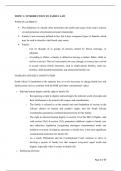Class notes
Family law
- Course
- Family Law
- Institution
- University Of The Witwatersrand (wits)
Semster 1 notes= Introduction to family which looks at the definition of who family is, what adaptionand Artifcial incldudingsurrogacyis and the laws related to it etc.
[Show more]



